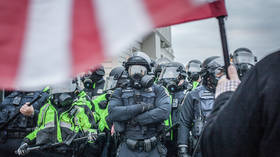More power for law enforcement would not have stopped Capitol riot, their inherent bias to the right is the REAL problem

Calls for the police to be given more powers following the Washington disturbances are misplaced. A more pressing concern is reining in their systemic reactionary tendencies and sympathies for the radical right.
In the wake of the recent Capitol riot in the US, coupled with new information from the FBI that suggests all 50 state capitals could soon be under siege, political figures across the country are calling for legislation that could greatly expand the powers of law enforcement and stifle freedom of speech and assembly.
Much of the proposed legislation in state legislatures is actually refigured versions of similar bills that were meant to silence the nationwide Black Lives Matters protests that happened in the wake of the killing of George Floyd by police in May last year.
As the country begins to perform an autopsy on what actually occurred at the Capitol on January 6, it is becoming more and more apparent that law enforcement had sufficient resources and intelligence to deal with the situation – but they decided not to. Police officers, several of whom were seen livestreaming with rioters, are now under investigation, and it’s apparent there were higher-ups who, for whatever reason, didn’t want to interfere with the mob.
The problem is not, as has been suggested, that law enforcement is needlessly shackled by bureaucracy, but exactly the opposite; police have too much discretion in selectively deciding how and when to apply their authority and defend the civil order. This is as evident in this latest example as it is in the day-to-day happenings across the country, where violence is selectively applied to certain individuals and groups but not others. In fact, as the Guardian noted, police are three times more likely to use force against left-wing protesters according to statistics from US Crisis Monitor.
Also on rt.com Caitlin Johnstone: Consent-manufacturing for Patriot Act II continuesThis structural bias against the left is nothing new. Take the story of leading American environmentalist and labor leader Judi Bari, who was severely injured after an improvised explosive device blew up her car on May 24, 1990.
Rather than the case being investigated as an assassination attempt, she was arrested for allegedly transporting a bomb while still in critical condition for her injuries that would later become enduring disabilities for the rest of her life.
What made the case especially strange was the fact that FBI bomb investigators – i.e. federal agents – were on the scene at virtually the same time as local first responders. It was later revealed that law enforcement was tipped off by an unknown person in advance. However, what became clear was that Bari was being framed for her own assassination attempt in what the FBI called “eco-terrorism.”
Several months later, the Alameda County district attorney refused to press charges against Bari and the other passenger, Darryl Cherney, despite the fact that the media had been saturated with the law enforcement side of events.
FBI Special Agent Frank Doyle had claimed in a public affidavit that the bomb was on the back seat floorboard of Bari’s car, while a later forensic investigation found that it was placed directly under the driver’s seat floorboard and had a timer-armed motion trigger. This meant that it was placed by an assailant to kill the driver of the car, Bari, who was clearly the target since it was her vehicle.
The conclusion that the FBI had drawn was undeniably false. But the most striking thing that came out of the federal civil suit that Bari’s estate and Cherney won was the fact that Bari had notified local law enforcement of death threats sent to her before the day of the bombing – all of which were ignored.
Law enforcement was apparently all ears when it came to tips that could damage Bari and discredit the environmental movement, but had their heads in the sand when it came to information that could have prevented an act of terror. This is analogous to how DC law enforcement was a bulwark against peaceful Black Lives Matter protesters in Lafayette Square compared with their pathetic showing at the Capitol.
Also on rt.com Lee Camp: America condemns one violent mob while celebrating anotherIn Bari’s case, would it have made any clear sense to provide Agent Doyle and his FBI colleagues with even more discretionary power? Would it have been a victory for society to simply criminalize the environmental movement altogether in order to stop such incidences from taking place?
The answer to both questions is obviously no. The problem is law enforcement itself, its systemic reactionary tendencies and its sympathy for the radical right – even and especially factions that use violence as a means to achieve political objectives. Hell, it’s even being reported that many off-duty officers (and military veterans) were part of the riots on the Capitol.
Without first addressing these facts, there will never be any serious application of impartial justice in the US, and any attempt to expand the role of law enforcement without this may as well just be a reversion back to the dark days of COINTELPRO. As Glenn Greenwald put it,“Liberals are having their 9/11 moment (again).”
Think your friends would be interested? Share this story!
The statements, views and opinions expressed in this column are solely those of the author and do not necessarily represent those of RT.














